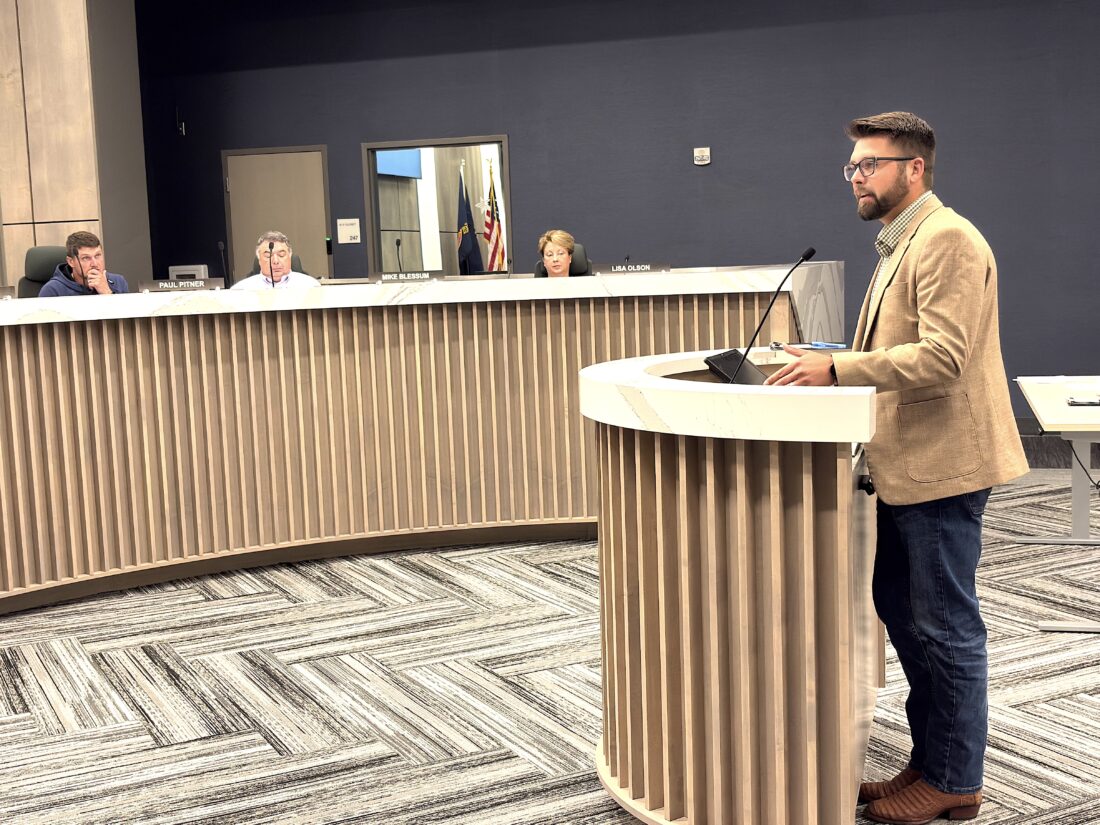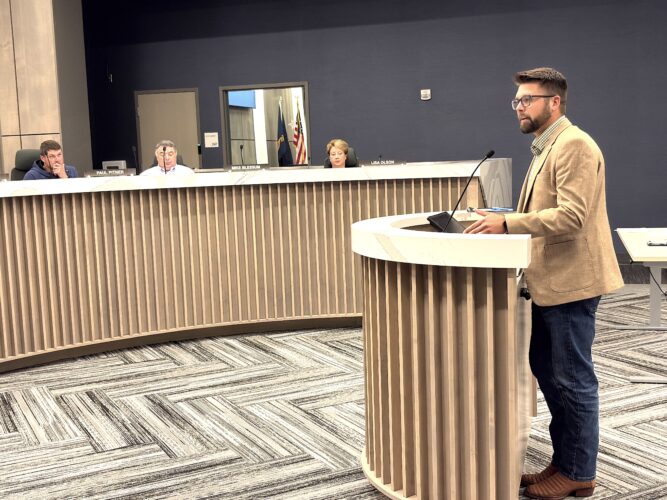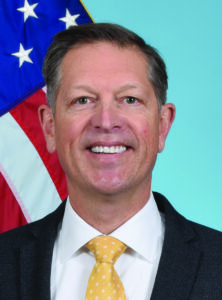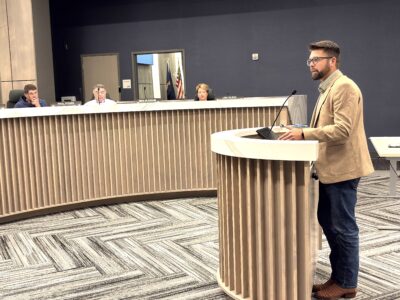Economic development and its continued funding through city sales tax was a focus of a parade of individuals who advocated their positions on the 2026 budget before the Minot City Council Monday, Sept. 15.
The council held a public hearing on a preliminary budget that remains a work in progress. The council spent time discussing the budget following the hearing and plans to continue discussion at its Oct. 6 meeting.
The preliminary budget released to the city council called for a levy of $29.5 million, up from $24 million in the current budget. The president’s budget message delivered by Mark Jantzer, now mayor, made adjustments that brought the levy down, and additional adjustments made by the council and staff since then have reduced the projected levy to $24.33 million.
With tax base expansion and other valuation growth, a homeowner with no property assessment change would see the city portion of the tax bill decline by 2%, Finance Director David Lakefield reported.
Among the president’s recommendations, Jantzer suggested reducing the percentage of sales tax dollars going to economic development from 15% to 10% and increasing sales tax dollars for property tax relief by 5%. It also proposed eliminating $500,000 for economic development projects.

Jill Schramm/MDN
Kevin Black speaks to the Minot City Council Sept. 15 on city spending for economic development. Council members from left are Paul Pitner, Mike Blessum and Lisa Olson.
Ryan Ackerman, board chair for Minot Area Chamber EDC, spoke about the need for continued economic development funding. He said he agrees that Minot should strive to be a community with a low tax, low regulation environment that relies on the market, but he noted all else must be equal.
“Of course, we aren’t equal to anyone else, and that’s why we need to work to make Minot more attractive and conducive to industry and to investment. The laissez faire or hands off economic policy – that’s not going to help Minot,” he said. “We have to work at this. We have to invest in this.”
Kevin Black, a member of the State Board of Higher Education, and Minot State University President Steve Shirley spoke about the benefits that economic development spending has had in bringing health education programs to Minot.
Resident Roscoe Streyle spoke of the benefits he’s seen with MACEDC’s Task Force 21, and agreed with Pete Hankla, Task Force 21 chair, who said economic development needs a reliable source of funding that sales tax can provide.
“We need that stability,” Hankla said.

David Lakefield
Minot businessman Jarid Lundeen spoke about creating opportunities for young people to stay.
“It’s so important for future generations to realize we have to invest in that future,” he said.
State Sen. Jose Castaneda, Minot, said the shrinking percentage of sales tax that has been going to support economic development over the years indicates those efforts are working to grow the economy.
“If you don’t need it, get rid of the penny. But I really do believe we need it,” he said.
Beth Feldner, who had served on the city’s Economic Development Review Committee, voiced concern about the handling of the committee’s recommendations by the council, particularly member Mike Blessum who chaired the review committee. Despite the sales tax delivering value for economic development, the council made moves to shift the sales tax away from economic development, she said.
“We cannot afford to lose momentum now. The projects that don’t happen here don’t just vanish. They pick somewhere else to be. Minot has to compete for these projects,” Feldner said. “We’re not asking for more dollars. It’s just that we do not believe property tax or general fund dollars are where economic development should be funded from.”
Minot resident Travis Zablotney questioned whether existing economic development efforts have moved the needle. He noted the need for farm workers is even greater than the need for dental workers, suggesting economic development dollars for jobs aren’t going where they can make the most difference.
“Who are we really helping when we bring businesses in? How many of these businesses are entrepreneurs from the local area?” he asked. “I think without entrepreneurship in Minot, we’re not going to create meaningful jobs.”
Minot resident Lianne Zeltinger supported directing more sales tax money to public safety and listed a number of areas within city government – from wayfinding signage to airport terminal design – where dollars could have been spent more wisely.
“We need better thinking from this city council,” she said. “This is the time to reassess our priorities.”
The council also heard from taxpayers concerned about the property taxes.
Rachel McFall, joined by her husband, Justin, and their infant child, spoke about the benefit of last year’s tax break by the council.
“The actions you took in 2004 resulted in cash directly back in the pockets of newlyweds who could really use it. So, today, as a couple who just welcomed a newborn baby, we ask you to remember us and all the other young families who are trying our best to live within our means in this community,” she said.
“We are tired. Our buckets are empty. We have no more money,” said resident Deanne Regalado. “We don’t need fancy signs. We don’t need parking garages that nobody uses. We need less taxes and we need less government in our lives.”
Two city employees are among three finalists for the position of Minot’s next city manager.
The finalists are interim city manager Tom Joyce, Finance Director David Lakefield and David Kees.
Joyce joined the city of Minot as assistant city manager in January 2024. He is a retired Air Force colonel who previously served as the deputy to the Garrison Commander at the U.S. Army Garrison Fort Carson in Colorado Springs, Colorado.
His education includes a bachelor’s degree in American government from the University of Virginia in 1986, a master’s degree from Purdue University in 1991, a master’s in military operational art and science from Air Command and Staff College in 2000, and a master’s of strategic studies from Air War College in 2005.
Lakefield, a certified public accountant, joined the city in April 2017.
He previously owned and operated Liberty Tax Service since 2003. His career has included as an educator at Minot State University and nine years with the Minot Police Department.
Information regarding Kees had not been released as of press time.
The city received 53 applications for the position.
Council hears from public on budget, economic development
Tom Joyce
Jill Schramm/MDN
Kevin Black speaks to the Minot City Council Sept. 15 on city spending for economic development. Council members from left are Paul Pitner, Mike Blessum and Lisa Olson.
David Lakefield
The North Dakota Supreme Court released an opinion on Thursday, Sept. 11, overruling a district court judge’s …
STANLEY– An estimated 840,000 gallons of emulsion spilled from a pipeline about 4 miles northwest of Stanley, …
Two people were arrested in connection with a Monday, Sept. 15, incident involving assault and terrorizing, …
WASHINGTON – The U.S. Army Corps of Engineers announced it will waive day use fees normally charged at boat …



